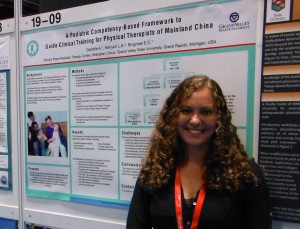Accreditation service provides a pathway to a global standard of education
This article was originally published by the World Confederation for Physical Therapy (WCPT) in WCPT News, January 2016. It has been republished with permission. The original article may be viewed at www.wcpt.org/news/Accreditation-service-Jan15.
The World Confederation for Physical Therapy (WCPT) has accredited two physical therapy education programmes in China – a country where the profession is at its earliest stages of development – to ensure that they meet internationally agreed guidelines.
The Confederation’s accreditation service is designed to assess programmes in countries where higher education providers seek to meet world standards. Started in 2014, it now has a bank of 39 expert reviewers, and has also reviewed programmes in Spain and Malaysia. Review teams are currently assessing programmes in Lebanon and China, and enquiries have also been received from Cambodia, China, Colombia, Haiti, Hungary, Jordan, Mauritius, Mexico, Nepal and Pakistan.
The programmes already accredited in China say the process has been an important one for them. Education programmes for health professions other than doctors and nurses have been slow to develop in China, and it was not until the country won the bid for the 2008 Olympic Games that permission to establish the first physical therapy programme was granted.
“Our vision has been to establish a local physiotherapy programme that meets international standards,” said Lijuan Ao, Chairman of the Department of Rehabilitation Therapy of Kunming Medical University. “So we inevitably sought WCPT accreditation. Now we have it, it means our students should be able to gain a more global view.” Professor Ao said she hoped it might also lead to more students studying abroad and gaining employment opportunities.
With government investment, support from the Chinese Association of Rehabilitation Medicine and advice from international experts, eleven entry-level education programmes for physical therapy have now been established in China, all modelled to some extent on WCPT’s guideline for physical therapist professional entry level education.
WCPT Vice President Margot Skinner was one of the reviewers for the first accredited Chinese programmes. “Helping China develop the physical therapy profession on the basis of international standards is a meaningful task and will significantly contribute to the health and welfare of nearly 1.4 billion people,” she said.
Margot Skinner is Chair of the WCPT Accreditation Committee, which advises the WCPT Executive Board on the accreditation service and the outcomes of reviews. Other members are: John Xerri de Caro, WCPT Executive Board member; Joan McMeeken, Professorial Fellow at the University of Melbourne, Australia; and Aimee Stewart, Associate Professor at the University of the Witwatersrand, South Africa.
“We want to ensure that the WCPT accreditation process for physical therapy programmes is rigorous, independent and transparent for those who use it,” says Margot Skinner. “WCPT has received many enquiries from countries where the profession is relatively young and where physical therapists are keen to ensure that, as the profession develops, education meets international standards. They believe that accreditation by WCPT, based on its policies and guidelines, will provide such an assurance.”
“The service is bound to develop over the years. We held a technical briefing about the service for member organisations before the 2015 General Meeting in Singapore, and the comments and feedback from that are being carefully considered by the Accreditation Committee, and will be fed into our planning.”
One of the programmes participating is at the Universidad Europea de Madrid in Spain. Beatriz Martínez, Director of Physical Therapy, says the university’s focus on quality means it has always been involved in different national and international accreditation processes.
“We have been teaching physical therapy since 1995. Having obtaining national accreditation a long time ago, we considered that our degree had to evolve and looked for an international accreditation to improve our quality standards according to international PT education guidelines. This is why we contacted WCPT to start the accreditation process.”
“We have been working together for nearly two years – first, to prepare all the documentation required and then last February the reviewers’ team spent two days with us and gave us very valuable feedback. Last August we were informed of the improvement areas we must apply to obtain accreditation. We have already implemented some of these and are now preparing a report to send to WCPT.”
“Throughout the process, there have been many learning opportunities for faculty and managers. Thanks to this accreditation process and the modifications suggested and applied, the quality of our physical therapy degree has improved a lot to meet the international guideline.”
The service provides an optional pathway for international recognition in addition to national programmes, or where a national system does not exist. It aims to contribute to the development of professional education internationally, leading to improved quality and availability of physical therapy services. “It also offers opportunities for more international collaboration for physical therapists,” said Margot Skinner.





